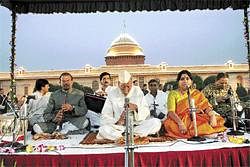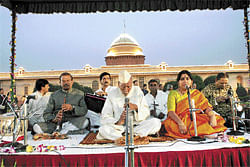

Not only George Harrison but also Hans J Salter, music composer of the legendary Come September expressed the same view. Ustad Bismillah Khan is not remembered as fervently as much he should be considering that he was the greatest shehnai player of all times. But for genuine music lovers and connoisseurs, he remains the last word in musical perfection.
Born in a lower middle class family in Dumraon, Bihar, Ustad Bismillah Khan received all encouragement from his beloved Mamujan (maternal uncle) to master the shehnai. The shehnai meant everything tohim.
Paying him a glorious tribute, Pandit Ravi Shankar confessed, “I am yet to come across a performer so dedicated and involved in his musical creations like Ustad Bismillah Khan. He was one performer who could soothe as well as create musical revolution with his shehnai, never bothering for any publicity or showmanship.”
Bismillah Khan was truly a son of the soil who never indulged in media hype, publicity machinations or beating his own drums. He expressed his likes and dislikes very openly. He voiced grave concern when some legendary musicians left India to settle in the USA. Lata Mangeshkar once said — ‘Ustadji is an inspiration for me but he never expressed any desire to perform jointly with me.
If ever I receive such an opportunity, I will of course not miss the golden chance of a Jugalbandi with the greatest shehnai exponent.’
When he performed the shehnai for old classic Goonj Uthi Shehnai, music director Vasant Desai gave him full liberty to perform variations. He understood very well the shehnai maestro’s temperament and dared not interfere in his work. Goutam Ghosh who shot a marvellous and the first ever documentary on Ustad Bismillah Khan remembers, “Khan saab was not temperamental. He believed in genuine emotions and was ideally cooperative when I shot the documentary at his residence in Benaras. I feel his nature was as uncompromising as that of Ustad Vilayat Khan.”
Dr Soma Ghosh, Manasputri of Ustad Bismillah Khan reminiscences, “My three most memorable concerts with him were Jugalbandis with Baba at Nehru Centre, Mumbai, Parliament House and Rashtrapati Bhavan. Generally Baba wore his white Gandhi topi as he was a true nationalist. But before a performing with me, he put down his Gandhi topi and wore his black cap playing the shehnai like a musicemperor. He encouraged me to sing like a sherni forgetting that I was performing with him. He was affectionate and caring like very few on this earth are.”
Satyajit Ray never worked with Ustad Bismillah Khan in any of his films but had highest regards for him. In a rare interview to Radio BBC, he confessed, “The shehnai is an instrument which conveys serenity and purity of the highest order. I did not have any subject where I could use the music of Ustad Bismillah Khan and I will never disrespect a musician of his caliber by misusing him.”
Ustad Bismillah Khan used to keep his eyes focussed straight on his shehnai when he performed and never looked anywhere around till he completed his performance. ‘Sangeet Hi Mere Liye Jannat Hai,’ was his life’s motto.
The Ustad passed away sadly like an unsung hero four years ago. His grave, neglected and uncared for lies forgotten by the government and countless music lovers he once enthralled.
Director Subhankar Ghosh who directed Yaadein Bismillah, the last documentary on the great Ustad, sighs, “I remember him like an enthusiastic, restless child, ready to cooperate with anyone his heart guided him to. It is a national shame that we no longer spontaneously remember one of our musical maestros who is at par if not greater than Pandit Ravi Shankar or Ustad Ali Akbar Khan.”